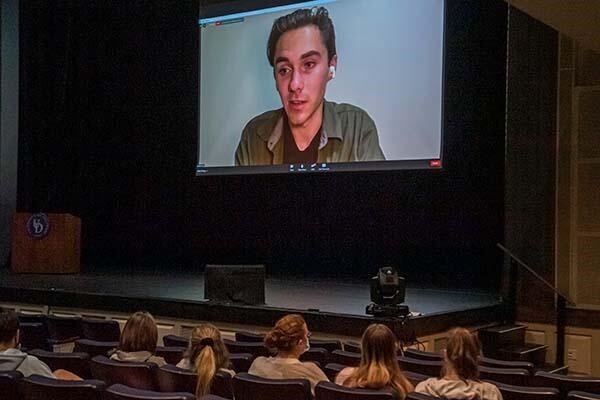Our Youth, Our Voices, Our Power
March For Our Lives founder David Hogg has a conversation about youth advocacy and changing our future as part of the National Agenda Speaker Series.

On Oct. 20, gun control activist David Hogg said young people can be powerful advocates for change. “At the center of power and politics is culture, but at the center of culture and what changes our culture is young people.”
By Abbey Negin, University of Delaware sophomore and intern for the University of Delaware’s Center for Political Communication
Watch the video. Read the transcript. Listen to Delaware Public Media. Read the UDaily story by UD junior Gina Cosenza.
NEWARK, Del – “Open a history book.” said David Hogg, a gun control activist and March For Our Lives co-founder, while explaining the impact of young people’s actions on systemic issues. “The important thing is the cultural change because at the core of political power in my view is the stories that we tell about ourselves. That is the fabric that is our culture.”
The University of Delaware welcomed Hogg, now a junior at Harvard University, to the fall 2021 National Agenda ?Reflecting America” speaker series on October 20, 2021. The event, presented by the Center for Political Communication, featured Hogg in a conversation with series director Lindsay Hoffman, Ph.D. Although the conversation was virtual, a watch party at Mitchell Hall on UD’s campus exposed both online and in-person viewers to a discussion of how Gen Z has been impacted by gun violence, as well as the role of young people in political movements more generally.
Hogg highlighted historic social protests that brought change, including the civil rights movement and the Vietnam War protests, both of which drove the push to lower the voting age to 18 from 21. “The reality is young people are at the core of our culture. If we define that culture and start building power now, we have the most valuable asset anyone can have: time.”
Hogg began his fight for gun control after a gunman attacked his school in Parkland, Florida on February 14, 2018. The mass shooting was one of the deadliest school shootings in US history, killing 17 people and injuring 17 others.
Alongside his classmates from Marjory Stoneman Douglas High School, Hogg, a senior at the time, organized the March For Our Lives demonstration in Washington, D.C. on March 24, one month after the shooting. March For Our Lives has since become a nationwide youth-led movement against gun violence.
The nonprofit organization now has 300 national, state, college, and high school chapters. Hogg reflected on the progress. “We went out there and we told the adults to do their jobs. We said, ‘Get over politics and get something done. We’re the young people and we need you to protect us. And if you don’t, we’re going to, we’re going to go out and vote.’”
Hogg expressed his frustration with pro-gun lobbies and cable news networks and stressed that the success of March For Our Lives depends on bipartisanship. “It shouldn’t be on the survivors of gun violence to go out and talk to armed protestors who are wielding the same weapon that killed 17 of my classmates and teachers.”
Despite this wish, gun control has historically been a partisan issue in the U.S. Connecting to the theme of “Reflecting America,” Hogg said civil discourse about gun control can bridge partisan lines. “What we’re advocating for is peace and creating a more tolerant society.”
“As young people, we’re the foundation for the years to come,” Hogg said. Although it is difficult to define such a diverse generation, he emphasized that Gen Zers live in a post 9/11 world with immense human-caused challenges such as climate change. “I think that’s fear but also combining that fear with hope and realizing we don’t have a choice to do anything else but address these issues.”
The University of Delaware’s March For Our Lives (MFOL) chapter, with current president Khazra Fatima, is one part of this nationwide network. “We believe strongly in the ideas of youth advocacy, power, and future change,” Fatima said. “Many of the members see the Parkland shooting as a defining event of our generation, as so many young people do, and we will work continuously to fight against gun violence in Newark, in Delaware, and in the nation.”
Over the years, UD MFOL has planned speeches, meetings, events, protests, guest speakers, and movie watch parties to support its advocacy goals alongside MFOL Delaware and the national organization. Past speakers include Delaware State Senator Sarah McBride, Rep. Lisa Blunt Rochester, and Traci Murphy, the executive director of the Delaware Coalition Against Gun Violence. For more information about UD MFOL, visit the website and Instagram page.
About National Agenda
For information about National Agenda, including links to videos, news stories, and transcripts, visit cpc.udel.edu/nationalagenda. Lindsay Hoffman, Ph.D., an associate professor of communication and political science at UD, directs the series. This year’s theme, “Reflecting America,” examines how this historic era of political divides, social movements, and economic upheavals – fueled by the pandemic and politics – is redefining America. National Agenda is free and open to the public. It is made possible with support from the University of Delaware’s Office of the Provost and the College of Arts and Sciences.
